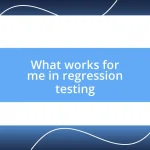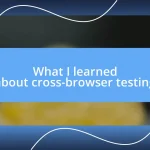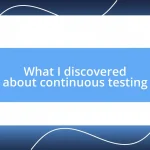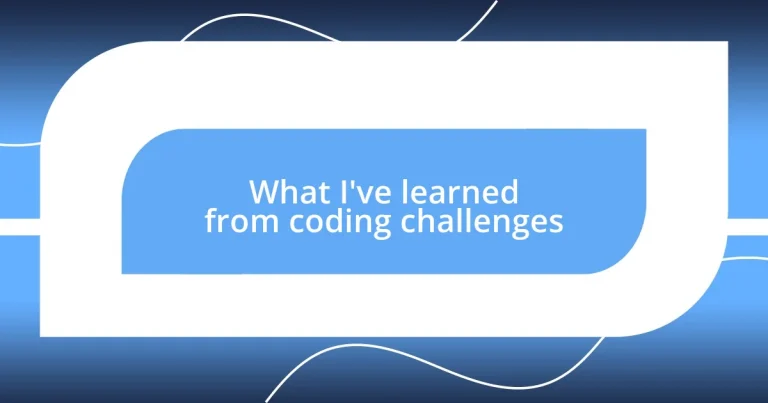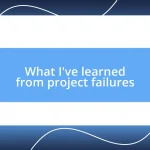Key takeaways:
- Coding challenges enhance problem-solving skills, creativity, and confidence while fostering community engagement.
- Effective strategies include breaking problems into smaller tasks, utilizing online resources, and ensuring adequate rest for mental clarity.
- Tracking progress and celebrating small victories boosts motivation and reflects personal growth in coding abilities.
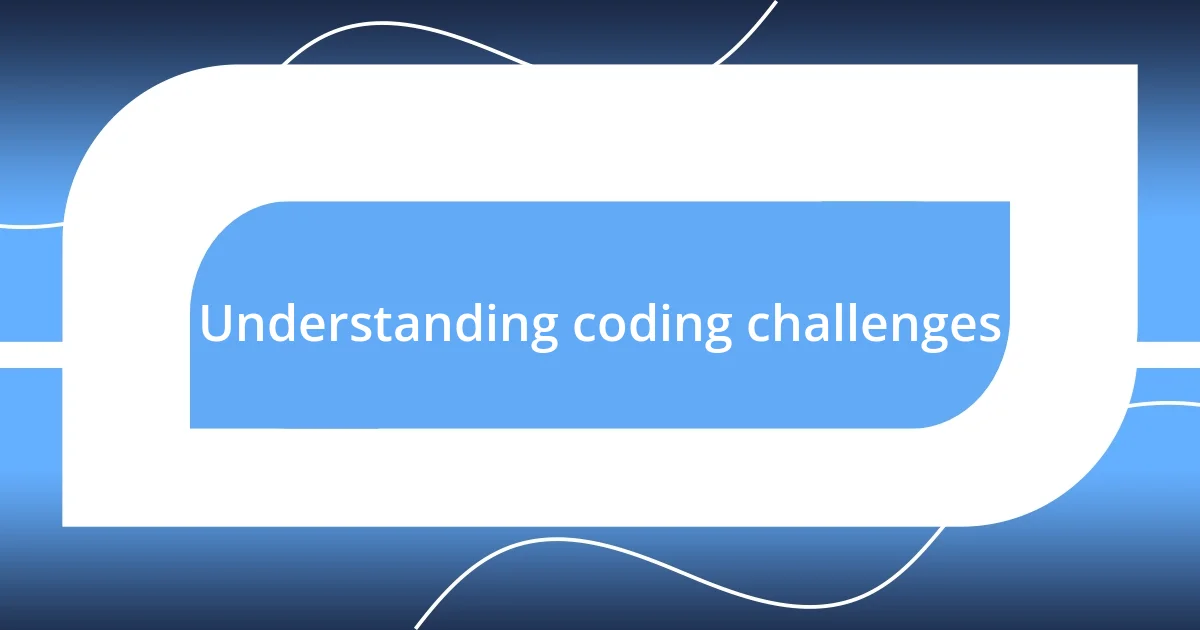
Understanding coding challenges
Coding challenges are like puzzles waiting to be solved, often requiring both creativity and logic. I remember the first time I encountered a particularly tricky problem; it felt daunting, but the thrill of cracking the code kept me going. Isn’t it exciting to see how a few lines of code can transform a simple idea into a functioning solution?
As I delved deeper into various challenges, I began to understand that they often teach more than just syntax and algorithms; they push us to think outside the box. There were moments when I felt stuck, but it was during those times that I learned the value of perseverance. Have you noticed how some of the best insights come when we take a step back and let our minds wander?
Moreover, coding challenges offer a unique opportunity to refine problem-solving skills. Each challenge is a chance to explore different approaches, making each experience a new lesson. I often reflect on how I used to limit myself to one method, but branching out opened new doors for me. Isn’t it fascinating how every minor adjustment can lead to completely different results?
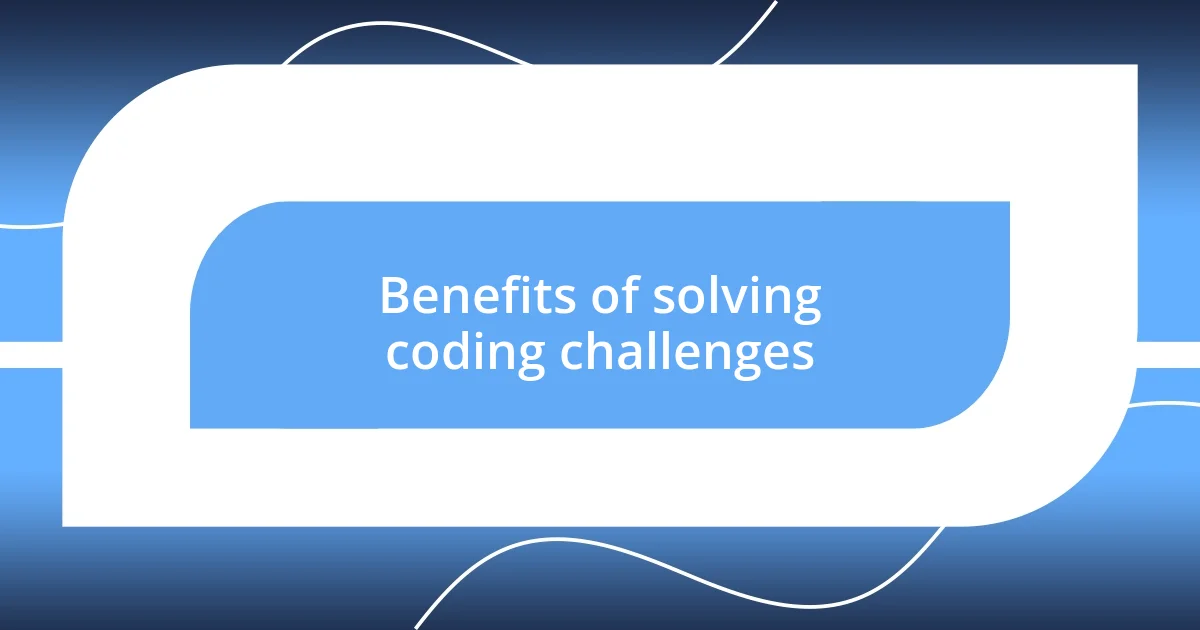
Benefits of solving coding challenges
Solving coding challenges has transformed the way I approach problems. I vividly remember working on a challenge that initially felt impossible—I kept running into errors, but instead of giving up, I decided to explore different algorithms. This not only taught me persistence, but it also revealed the importance of adaptability in programming. Each time I step into a new coding challenge, I feel like I’m sharpening my mental toolkit.
Here are the key benefits I’ve discovered from tackling these challenges:
- Improved problem-solving skills: Each challenge enhances our ability to dissect complex problems.
- Enhanced coding proficiency: Regular practice fine-tunes our syntax and understanding of various programming languages.
- Boosted creativity: Finding unique solutions fosters innovative thinking.
- Increased confidence: Successfully overcoming challenges builds a sense of achievement and self-assurance.
- Community engagement: Participating in coding challenges connects you with fellow enthusiasts, broadening your perspective and support network.
I always cherish the moments when I feel that rush of excitement after finally solving a problem that had me tangled for hours. It’s this mix of effort, learning, and triumph that makes every coding challenge worthwhile.
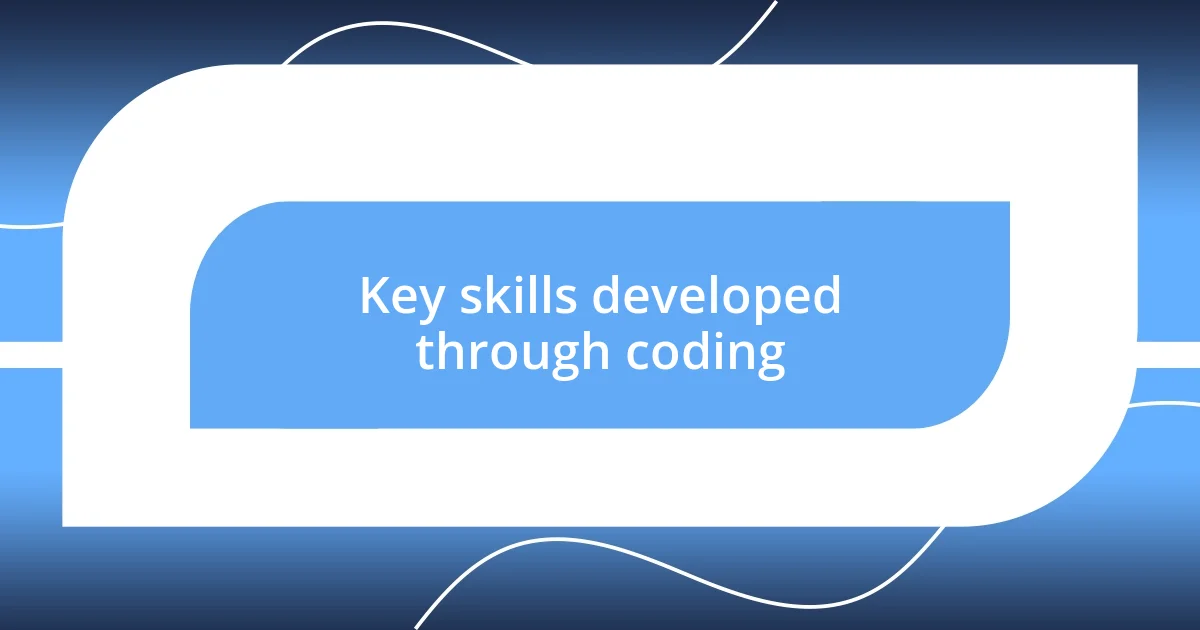
Key skills developed through coding
Through my journey in coding, I’ve honed a variety of key skills that have significantly shaped my coding abilities. One notable skill is logical reasoning, which I’ve found essential when breaking down complex problems into manageable parts. For instance, I remember tackling a challenge involving data structures; it required not just technical knowledge but a strategic mindset to visualize how different elements interacted. The sense of clarity that came with mapping out each step was incredibly rewarding.
Another crucial skill is time management. Initially, I struggled with pacing myself during challenging tasks, often spending too much time on one aspect and losing sight of the bigger picture. But I’ve learned to allocate my time efficiently across problems, which allows me to tackle multiple challenges in a single sitting. I can’t help but recall a particularly intense weekend where I set a timer for each round of problems—a game-changing strategy that brought a new level of structure to my coding practice.
Finally, collaboration skills are often underappreciated but incredibly vital. I’ve participated in coding competitions where teamwork made all the difference. Discussing strategies and sharing insights with my peers not only enhanced my understanding of various concepts but also fostered a sense of camaraderie. I cherish those moments when we celebrated a breakthrough together, as they reminded me that coding is often as much about community as it is about individual skill.
| Skill | Description |
|---|---|
| Logical Reasoning | Breaking down complex problems into manageable components. |
| Time Management | Efficiently allocating time to tackle multiple challenges effectively. |
| Collaboration | Enhancing understanding through teamwork and shared insights. |
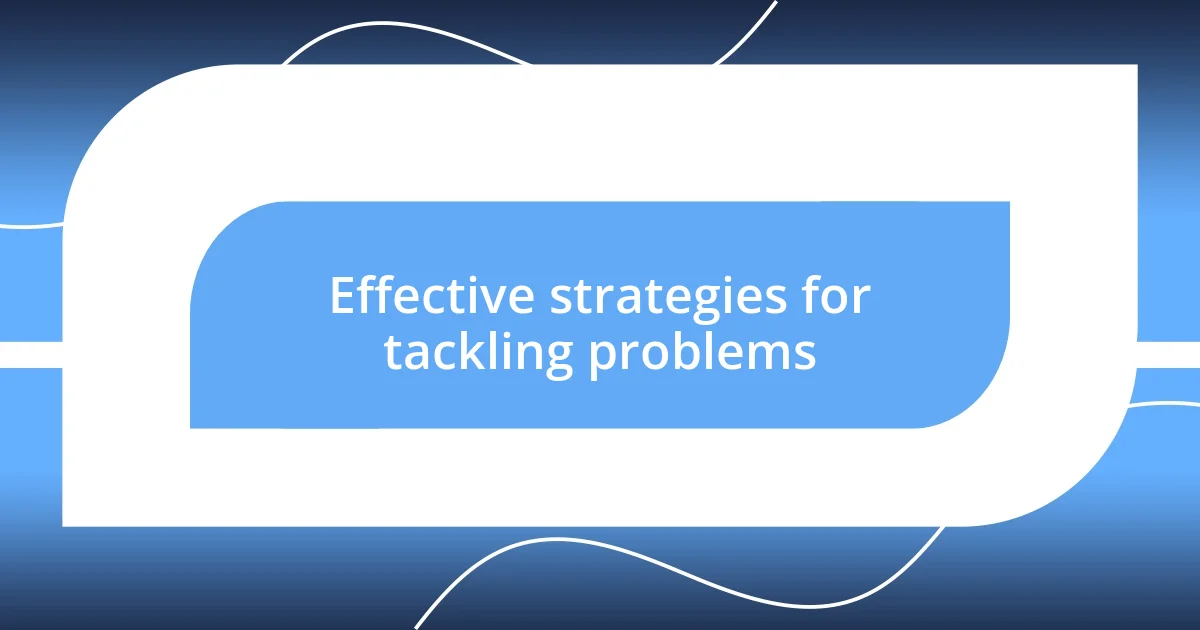
Effective strategies for tackling problems
When it comes to tackling coding challenges, breaking the problem down into smaller, more digestible tasks has been a game changer for me. I remember staring at a particularly daunting algorithm question and feeling overwhelmed. But as soon as I started dividing the problem into smaller components, the fog began to clear, and I could see a pathway forward. Have you ever had that “aha!” moment? It’s like turning on a light in a dark room—everything becomes more navigable.
Another strategy that I’ve found invaluable is to leverage online resources and forums. There was a time when I hit a wall on a challenge and felt utterly stuck. Instead of letting frustration take over, I turned to various coding communities, where I found not just solutions, but also a treasure trove of different perspectives and approaches. It’s amazing how a fresh pair of eyes can ignite new ideas. Have you ever explored community insights to bridge your knowledge gaps? It’s one of the most rewarding experiences in coding—realizing that you’re part of a larger learning ecosystem.
Lastly, don’t underestimate the power of a good night’s sleep. There were occasions when I ground away at a problem late into the night, convinced that I could find the answer if I just pushed a little more. But I’ve learned that sometimes, the best strategy is to step back and allow your mind to rest. I can’t count the number of times I’ve woken up with clarity and a solution that had eluded me the night before. It’s a gentle reminder that embracing rest can fuel our problem-solving prowess in unexpected ways. Have you ever gone to bed frustrated only to wake up with a fresh perspective? It’s a beautiful reminder of how our minds can process and innovate while we recharge.
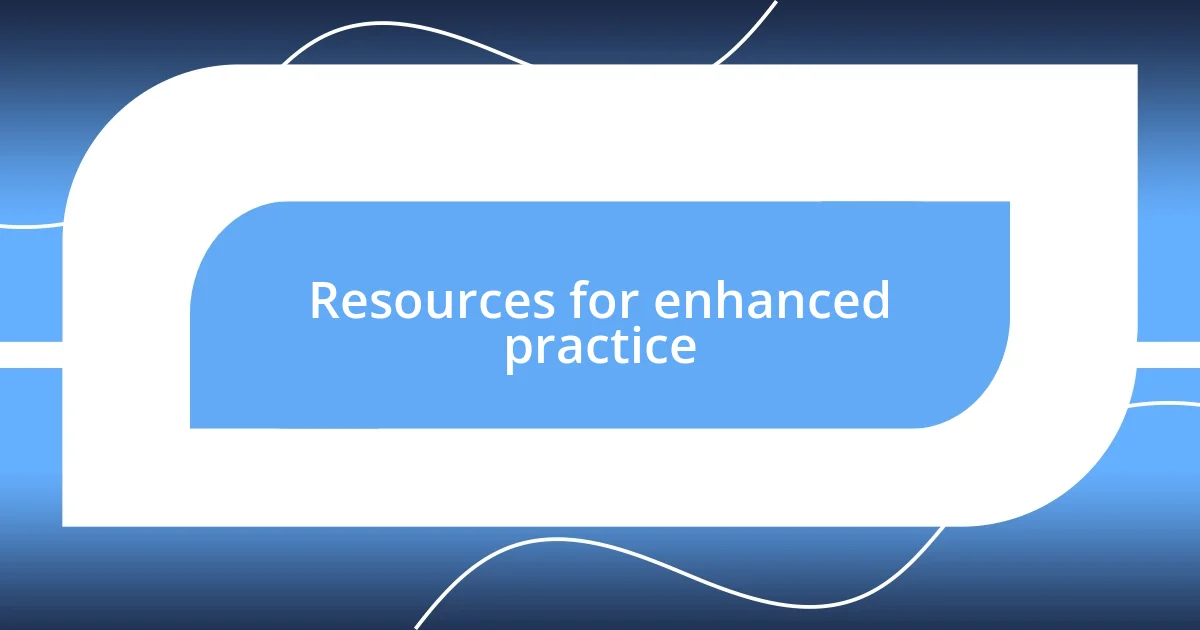
Resources for enhanced practice
When it comes to finding resources for enhanced practice in coding, I’ve constantly turned to platforms like LeetCode and HackerRank. My first experience with these was a bit overwhelming; there were so many problems to choose from! However, I soon discovered that they offered curated lists for various skill levels, helping me to tackle challenges that matched my growth stage. This approach not only built my confidence but also ensured that each problem I solved felt like a worthy addition to my learning arsenal.
Additionally, I frequently find value in coding YouTube channels. I recall stumbling upon a channel dedicated to algorithm tutorials; the host’s clear explanations made the concepts so much more digestible. Watching someone break down a complex idea into relatable segments not only clarified my understanding but also inspired me to experiment with code in ways I hadn’t considered. Have you ever watched a tutorial that transformed your thinking? It’s interesting how a different perspective can illuminate pathways I’d previously overlooked.
Lastly, don’t underestimate the power of coding meetups and hackathons. I remember attending a local coding night filled with enthusiasts just like me, eager to share insights. The energy was infectious! Collaborating on a project in real-time opened my eyes to different coding styles and problem-solving techniques. I often left these events feeling invigorated and full of fresh ideas. Have you participated in a community event that reignited your passion for coding? Those connections can be a lifeline, fostering growth in ways solitary studying never could.
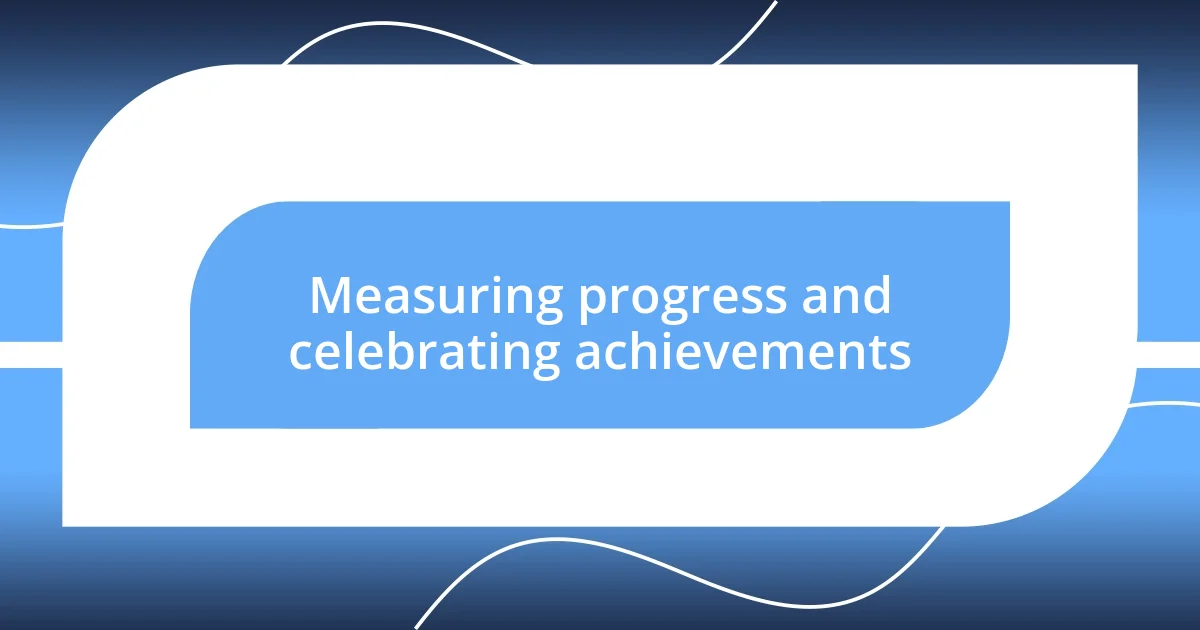
Measuring progress and celebrating achievements
Measuring progress in coding challenges often feels like traversing a winding path. I remember when I first started, I would create a simple checklist that tracked my completed challenges. Seeing those checkmarks accumulate gave me a tangible sense of advancement. Have you ever experienced that surge of motivation when you realize how far you’ve come? Celebrating those small victories can mean the difference between feeling defeated and inspired.
Tracking personal metrics, such as time spent on challenges or the number of attempts before arriving at a solution, has also been enlightening for me. I once spent several weeks focusing on dynamic programming problems, initially struggling to make sense of them. However, by keeping a log, I noticed my performance improving gradually—what once took me hours began to take minutes. It’s exciting to quantify that growth and reflect on just how much I’ve learned. Does tracking your progress help you stay committed? It certainly has for me.
Moreover, I discovered the joy of sharing my achievements with friends who are also on a coding journey, leading to a culture of celebration. After completing a particularly tough problem, I shared my success over coffee, and we basked in each other’s victories, both big and small. There’s something incredibly uplifting about sharing these milestones with peers. Have you found a community that celebrates your coding journey? I believe that collective acknowledgment of our hard work amplifies our motivation to continue challenging ourselves.




